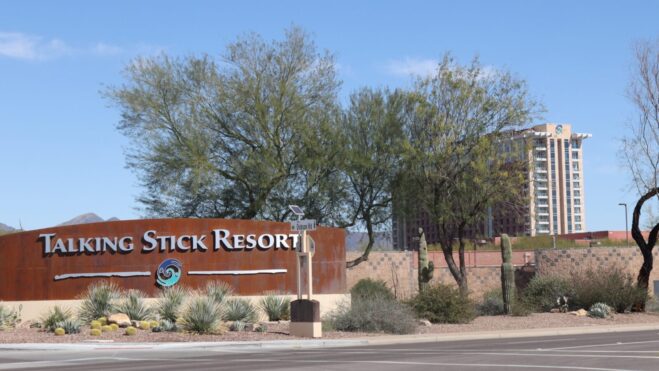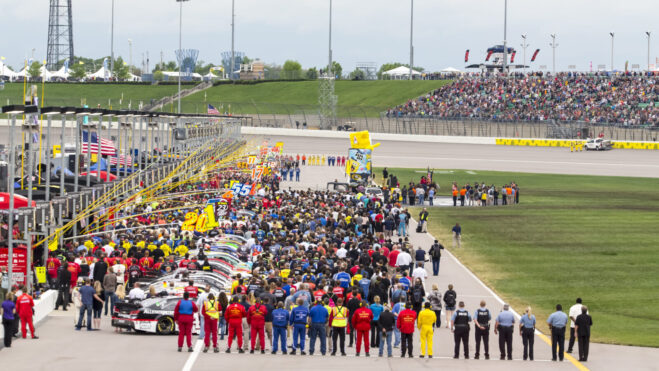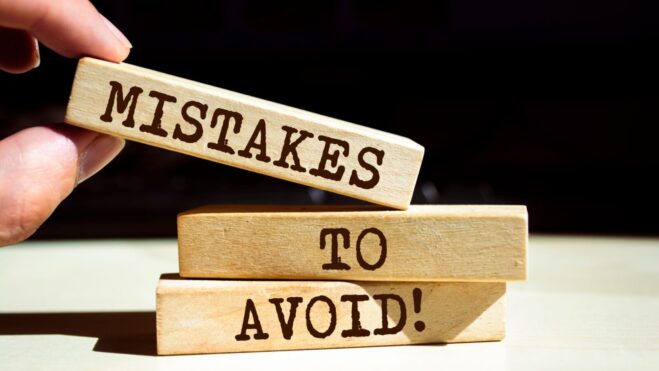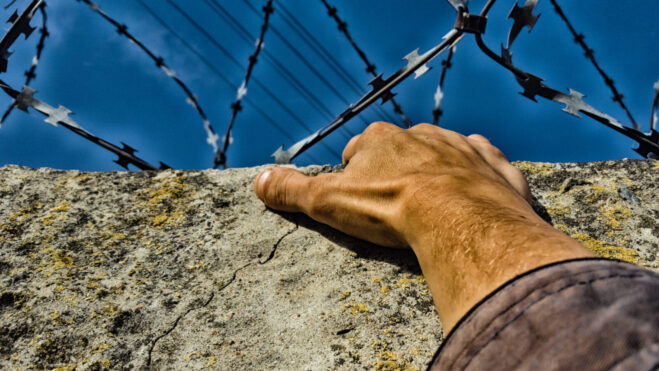DraftKings, FanDuel Make Nice With Indian Country, But California Legalization Scenario Remains Elusive
Creating something generational in California ‘starts from tribal ownership and sovereignty’
5 min
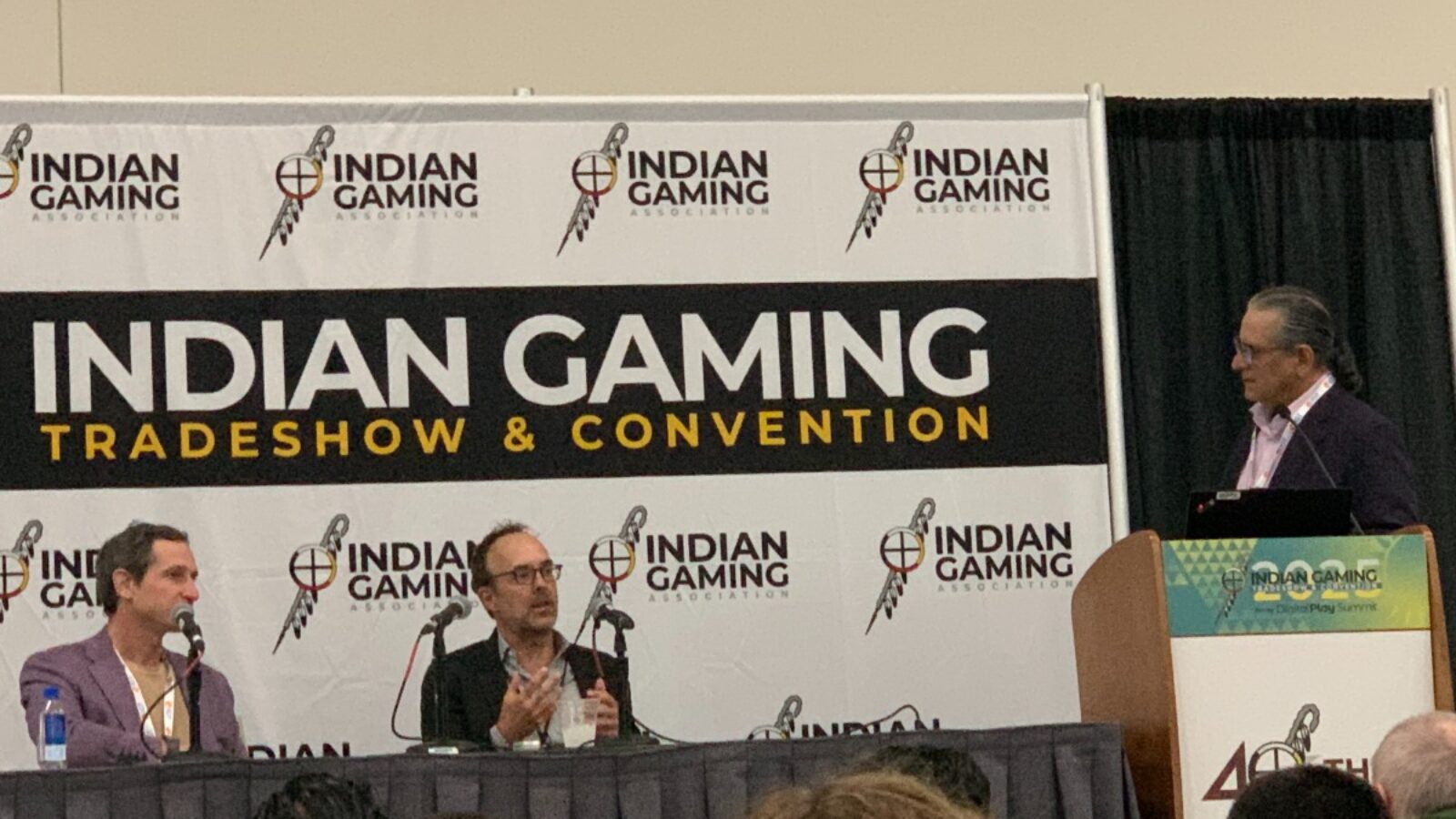
SAN DIEGO — Two of the biggest names in online sports betting sat in front of a packed room at the Indian Gaming Association conference Monday and said all the right things.
Partnerships with tribes are important. Learning about tribal sovereignty is vital for success. Allowing Indian Country to take the lead is of paramount importance.
DraftKings co-founder Jason Robins and FanDuel President Christian Genetski admitted to past mistakes and continued the mea culpa tour Genetski began just over a year ago.
Asked if commercial operators would again try for a ballot initiative in California, Genetski said it is “safe to say” they won’t. After a blistering battle leading into the 2022 elections, seven commercial entities — DraftKings and FanDuel included — experienced one of the worst initiative defeats in California history.
And the state’s tribes showed what they were willing to give up to defend their right to exclusivity and maintain their sovereignty. California Indian Country spent nearly a quarter of a billion dollars to defeat Prop 27, which would have legalized digital sports betting in the state. In the process, the tribes killed their own retail wagering initiative. And they were unapologetic.
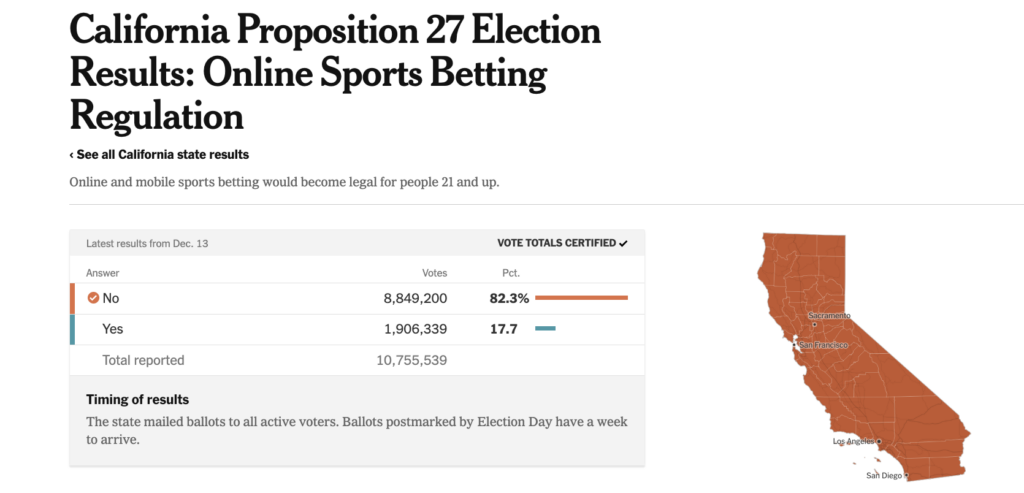
Winds of change
But 18 months on, an evolution took root. Robins and Genetski said their companies will continue to try to make inroads into Indian Country and step back while the tribes lead the way.
“In California, there is not a chance for sports betting unless the tribes are running it, it can’t happen,” Robins told moderator Victor Rocha during the “The Power of Partnerships: Aligning with Established Gaming Brands” panel. “That’s been the thing that we’ve really learned. … When we first did a ballot initiative in California, we didn’t really understand it was so different. We just thought that if everyone is making money then it would be all good. But it was totally different in regard to conversations we’ve had here.”
Said Genetski: “I think that there will be an opportunity to make something happen and create something that is generational in California. We know that needs to come from the tribes, and we have said we will be accessible. It starts from tribal ownership and sovereignty. We want to contribute what we can to creating a big pie that we can then share.”
Rocha, the conference chairman and founder of Pechanga.net, led the discussion. It was cordial and pleasant. Rocha thanked Genetski and Robins for agreeing to speak and the pair said they were grateful for the opportunity.
But wait, there’s another issue, too
While the politicking on the dais appears to be some sort of indication of a sea change, the commercial wagering industry can’t solve the biggest conundrum in California. There are simply too many tribes — more than 100, including gaming and non-gaming tribes — and not enough operators to go around.
“In a state that has 100-plus tribes and 20 of them are gaming tribes, they may need something different than a state with four tribes,” Genetski said. “So, we want to know what tribal sovereignty means to each tribe. I think both of our companies are probably pragmatic over everything else, where we can find a solution that works for everyone.
“It needs to not feel like musical chairs and people have to feel like there are enough partners for everyone. They have to feel like the playing field is level. And FanDuel has to feel like that, too. But if you feel like you have eight tribes that don’t feel like they are winning, then we are all not winning, as well. I feel like that’s the challenge in California.”
It’s been a challenge elsewhere, too. DraftKings and FanDuel dominate online sports betting market share in the U.S. BetMGM, Caesars Sportsbook, ESPN Bet, and Fanatics Sportsbook are also national players at a lower tier. After those six, most other online sports betting companies are regional or specialized or enjoy less brand recognition.
Under state law, not all Arizona tribes have sports betting licenses. In that state, both DraftKings and FanDuel are partnered with professional sports organizations rather than tribes. Some tribes there have already signed and lost partners as the number of successful wagering companies in the U.S. contracts.
It’s likely that some of Minnesota’s 11 tribes will experience a similar situation when that state eventually legalizes. And some Oklahoma tribes — there are 39 tribes there operating more than 125 casinos — could ultimately find themselves in similar situations.
Could the problem be solved if major operators agree to partner with multiple tribes? Or if the tribes themselves form coalitions? What if Indian Country chooses to go with white-label platforms vs. commercially branded platforms? How much money will the non-gaming tribes in California get in any scenario?
Indian Country has long been wrestling with these questions. None were directly addressed Monday. But the tone in San Diego was decidedly different than the contemptuous campaigns both sides ran ahead of the 2022 election.
Constructive conversation
Instead of pointing fingers and calling names, both sides engaged in a discussion that explored some successful commercial-tribal partnerships. Rocha pointed to the partnership between Michigan’s Bay Mills Community and DraftKings. And all three pointed to the commercial-tribal partnerships in Connecticut.
Those partnerships, and others in Indian Country across the U.S., Robins said, are markedly different than traditional commercial relationships. Genetski acknowledged that a relationship with a tribe isn’t about quarterly reports, but about long-term commitments and the real-world difference that success can lead to tribes.
“In terms of the way the economics work, it’s not really all that different. But the way that the relationship works it totally different,” Robins said. “For our tribal partnerships, we’re going to the powwows and we’re in the community. It is the understanding that this is something that is having an impact in a way that you can’t compare to a commercial partnership.
“DraftKings had all of our tribal partners into the office and had them speak. The personal connection isn’t the same as with commercial partners.”
Robins said the impact of that visit may been “the most interesting thing” to happen to employees. FanDuel has had similar events and both companies are engaged in outreach, visiting tribal nations and trying to see the world through Indian Country’s eyes.
Why tribes fight so hard for sovereignty
While every tribe in America has its own agenda, most at some point in history struggled to keep their land and retain their traditions. Under the 1830 Indian Removal Act, the Cherokees, Choctaws, and Chickasaws were among those forced to leave their ancestral lands on the east of the Mississippi River and move west. Between 1769-1833, Spanish settlers in California forced Native Americans off their lands and into missions. The goal was to convert tribal members to Catholicism and expand Europe’s reach. Years later, Native Americans were forced onto reservations.
The experiences bound tribes across the nation in their fight for sovereignty. Federally recognized tribes were granted exclusivity to gaming in 1988. That decision made many tribes self sufficient. And Indian Country is united in not giving up the ground — literally and figuratively — that it has gained. This is the lens through which commercial operators must learn to view tribal partnerships.
Rocha was quick to praise DraftKings and FanDuel for their efforts. He also pointed to a long-running partnership between Harrah’s (Caesars) and the Rincon tribe. But he also called out MGM, a company he said would not be welcome in California.
“I believe you two, that you understand the ramifications and you understand sovereignty,” Rocha said. “But then other companies like like MGM have made it about going against the tribes, against Pamunkeys in Virginia and the Wampanoag in Massachusetts. They don’t get a pass.”
What legal sports betting in California will ultimately look like is still unclear. And the soonest anyone might get clarity will be ahead of the 2028 presidential election. California tribal leaders have already said they won’t run a ballot initiative in 2026. They are aiming for 2028, but with no promises.
Relationships between the industry and Indian Country are fraught. But Monday’s panel was another of incremental change.



